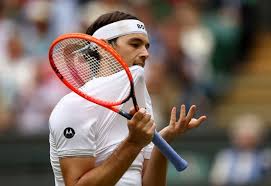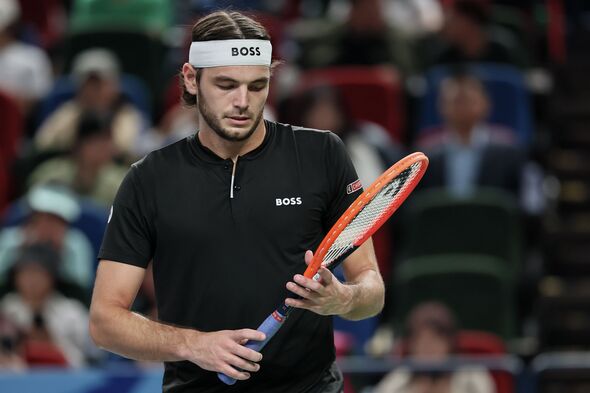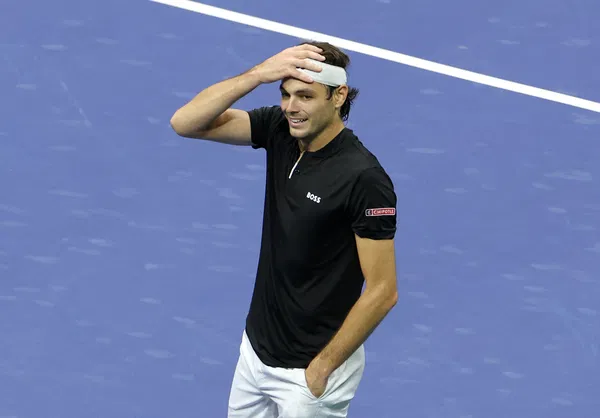‘Hurting Him’: ‘Stubborn’ Taylor Fritz’s Kryptonite Exposed as Tennis Legend Makes Daunting Prediction
American tennis star Taylor Fritz has often been touted as the next big hope for U.S. men’s tennis, with his powerful game and fearless mentality propelling him to stardom. However, while Fritz has shown flashes of brilliance on the ATP Tour, there’s been growing speculation that his own stubbornness might be the Achilles’ heel holding him back from reaching the top tier of the sport.

Adding fuel to this narrative, a recent prediction from a tennis legend has left fans buzzing. This tennis great has not only pinpointed Fritz’s weaknesses but also made a bold forecast about his future on the global stage. Could Fritz’s “kryptonite” truly derail his dreams of Grand Slam glory, or is this just another hurdle for him to overcome? Let’s dive into the fascinating dynamics surrounding Fritz’s game, his mentality, and the potential roadblocks ahead.
The Rise of Taylor Fritz: A Star in the Making
Taylor Fritz burst onto the tennis scene as a young prodigy with massive potential. His powerful serve, strong baseline game, and calm demeanor under pressure quickly earned him recognition as a player capable of contending with the best. As of now, Fritz holds multiple ATP titles and has cemented himself as one of the top American players on the tour.
What sets Fritz apart is his ability to battle against tennis elites. In recent years, he’s taken down stars like Rafael Nadal and Alexander Zverev, showcasing his knack for delivering on big stages. His historic victory over Nadal at Indian Wells in 2022—despite playing through injury—put the tennis world on notice. Fritz doesn’t shy away from the fight; instead, he thrives in it.
But despite his impressive resume, there’s a growing sentiment that Fritz is hitting a ceiling. As other young stars like Carlos Alcaraz and Jannik Sinner continue to ascend, critics have begun to question whether Fritz’s game, as it stands, is enough to win the sport’s most prestigious titles.
The Kryptonite: What’s Holding Fritz Back?
While Fritz is undoubtedly a force on the court, even his staunchest supporters can’t ignore the areas of his game that remain vulnerable. At the heart of these weaknesses lies a recurring critique: his reluctance—or perhaps stubbornness—to adapt.
One of the biggest challenges Fritz faces is his one-dimensional approach in high-pressure matches. While his baseline power is formidable, tennis analysts argue that his lack of variety limits his ability to counter opponents who excel in changing pace or mixing in unconventional tactics. Against players like Daniil Medvedev or Stefanos Tsitsipas, Fritz has often struggled to break through their defensive walls, especially in longer rallies where patience and shot selection are critical.
A prominent tennis legend recently weighed in on this debate, stating, “Fritz has all the tools to be great, but his insistence on sticking to his strengths—rather than developing a Plan B—might be hurting him in the long run. At the highest level, stubbornness can be kryptonite.” The comment struck a chord with fans, sparking widespread discussion about whether Fritz is too rigid in his playing style to reach the pinnacle of the sport.
A Daunting Prediction from a Tennis Great
The tennis legend didn’t stop at critiquing Fritz’s game; they also made a bold prediction that has left the tennis world reeling. “If Fritz doesn’t embrace change, I don’t see him winning a Grand Slam in the next five years,” they declared. “He’s got the talent, but the game has evolved. Without adaptability, the gap between him and the likes of Alcaraz or Djokovic will only grow.”
The forecast is both sobering and motivating. On one hand, it underscores the brutal reality of competing in an era dominated by versatile and explosive players. On the other, it highlights a potential path forward for Fritz: evolve or risk stagnation.
For context, many of the game’s greats have faced similar crossroads. Roger Federer, for instance, reinvented his backhand to counter Rafael Nadal’s topspin-heavy forehand. Novak Djokovic adapted his diet and physical training regimen to boost his endurance. If Fritz can similarly embrace growth, there’s no reason he can’t defy the odds and rewrite his story.
The Stubbornness Debate: Is It Really a Weakness?
Labeling Fritz as “stubborn” might seem harsh, but the term has sparked significant debate. In many ways, his unwavering confidence in his abilities is also what makes him such a fierce competitor. Fritz has repeatedly expressed his belief that sticking to his strengths is the key to his success, and he’s not entirely wrong. After all, his powerful forehand and precise serving have brought him victories against some of the world’s best.
But at what cost? Matches against crafty opponents like Nick Kyrgios or the relentless Medvedev have exposed the limitations of Fritz’s approach. When Plan A doesn’t work, Fritz often struggles to adapt mid-match, leading to frustrating losses in matches he seemed capable of winning.
Perhaps the term “stubborn” could be reframed as “determined.” Fritz’s mental toughness is a double-edged sword—it fuels his success but may also prevent him from embracing necessary changes. Striking the right balance between confidence and adaptability could be the key to unlocking his full potential.
What Fritz Can Learn from His Rivals
To better understand Fritz’s path forward, it’s worth examining the strategies employed by his contemporaries:
- Carlos Alcaraz: The young Spaniard’s fearless, all-court game has made him one of the most exciting players on tour. Alcaraz’s willingness to attack the net, mix in drop shots, and dictate play with variety has set him apart from players who rely too heavily on baseline power.
- Jannik Sinner: Sinner’s ability to hit with consistent depth and pace, coupled with his improved serve, has allowed him to compete with the sport’s elite. His offseason work on fitness and shot tolerance is a testament to his commitment to evolving.
- Daniil Medvedev: Medvedev’s defensive mastery and tactical brilliance make him one of the toughest opponents to beat. His ability to anticipate and counter any strategy forces his opponents out of their comfort zones.
For Fritz, adopting even a fraction of the adaptability and creativity displayed by these players could make a significant difference in his results.
The Path Forward: How Fritz Can Overcome His Kryptonite
While the tennis legend’s critique may seem daunting, it also serves as a wake-up call for Fritz to address the areas of his game that need improvement. Here are some actionable steps he could take:
- Develop a Strong Net Game: Adding variety to his approach by incorporating frequent net play could help Fritz keep opponents guessing. His height and athleticism make him well-suited for volleying, but he rarely ventures to the net.
- Enhance Defensive Skills: Improving his movement and ability to retrieve shots in defensive positions would make him a more well-rounded player, capable of extending rallies and forcing errors.
- Mental Flexibility: Working with a sports psychologist to foster a growth mindset could help Fritz embrace change without compromising his core identity as a player.
- Strategic Coaching: Bringing in a coach known for fostering adaptability—someone like Darren Cahill, who has worked with multiple Grand Slam champions—might give Fritz the edge he needs to level up his game.
Conclusion: Can Fritz Rise to the Challenge?
Taylor Fritz is at a pivotal moment in his career. The potential is there, but so are the challenges. While being labeled as “stubborn” might sting, it also highlights an opportunity for growth. By addressing his weaknesses and embracing a more flexible approach, Fritz could very well prove the doubters wrong and make a serious push for Grand Slam glory.
The tennis world will be watching closely to see how Fritz responds to the critiques and predictions that have come his way. Will he rise to the occasion, or will his kryptonite hold him back? One thing is for sure: the next chapter of Taylor Fritz’s journey promises to be as compelling as it is unpredictable.

